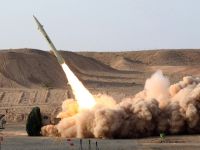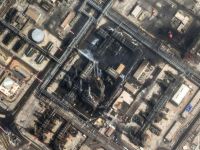The Gulf Cooperation Council's pavilion at the UN climate talks is one of the most striking: Blazing white walls of classic Arabic design, bright lights, luxurious leather furniture.
Across the hall are the humble pressed-wood walls of the African Countries Group and another organization, the G77, which represents more than 130 poorer countries fighting for money to help them adapt to global warming blamed on the burning of fossil fuels.
For nearly two weeks, 195 countries have been grappling over a new agreement to keep Earth cool. The two main culprits putting heat-trapping emissions into the atmosphere are fossil fuels and deforestation.
But even as large investors declared they would withdraw trillions of dollars from the coal and oil industry and as activist groups called for total decarbonization, Saudi Arabia has stood steadfast in protecting the main source of its income - oil.
Any efforts to reduce carbon emissions should "not discriminate" against any one energy source, said Saudi Arabia's Petroleum and Mineral Resources Minister Ali al-Naimi this week.
Instead, all energy sources should complement one another, he said.
Saudi Arabia has over the years consistently tried to prevent ambition by UN climate efforts. For a long time, however, most public criticism was directed at the United States for its refusal to cooperate in any deal that exempted its economic rival China and other emerging economies.
This year is different. The US and China have stepped up to lead efforts to find a 2020 deal to replace the Kyoto Protocol.
That has put increasing pressure on Saudi Arabia, which many critics say has been blocking an ambitious climate deal. It has that leverage because of the need for consensus on any deal - giving its one vote enormous power.
"Saudi Arabia is blocking because other Arab countries are not exercising peer pressure on them," charged Safa' al Jayoussi, of the group Indy ACT, one of the civic observers at the talks.
In the annual Climate Change Performance Index released Tuesday by GermanWatch, Saudi Arabia ranked as usual at the bottom among 58 countries for its efforts on climate change.
"Saudi Arabia is the only country that I would call a total deal-breaker," Germanwatch expert Jan Burck told dpa.
Venezuela, another country that is strongly dependent on oil exports, is also resisting an ambitious deal, according to observers and delegates from western industrial nations.
But no one is fighting quite as strongly as Saudi Arabia against the vision of the G7 group of most industrialized nations for a climate-friendlier world that will eventually get along without oil, gas or coal.
The Saudi minister was careful in his formulation. Oil and gas exports now make up about 85 per cent of the country's export income. If that money source were to dry up, social peace in the desert country would be put at risk. What might then happen can already be seen in the mass flood of immigrants into Europe who are fleeing unrest in Syria and elsewhere in the Middle East.
Saudi Arabia has long been under pressure by western countries to reduce its reliance on oil by developing other sectors of its economy.
Al-Naimi addressed the issue carefully in his remarks this week, referring to an agreement from more than three years ago about the country's need for economic diversification.
"The kingdom shall take action, adopt plans and implement programmes planned to promote economic diversification and achieve the common benefits of avoiding greenhouse gas emission," he said.
The reference appeared to be to future plans, not to something already underway.
The Saudis are also intent on being considered a developing country when it comes to receiving aid for adaptation to and mitigation against global warming - even though it belongs to the G20 group of the world's leading industrial and emerging economies.
Saudi Arabia's huge influence in the Middle East and North Africa plays a large role in its leverage.
But its support for Islamist militants in Syria and its airstrikes in Yemen are the object of increasing criticism in Europe.
The US and Canada, with their growing production of oil, are decreasing their dependency on Middle East oil - sending another message to Saudi Arabia about its waning influence.
By Pat Reber








